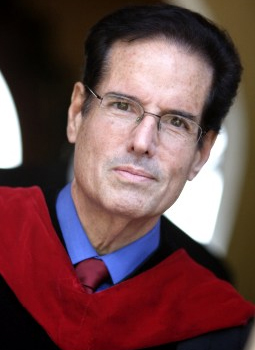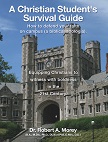Answering Questions from Pacifists
By Dr. Robert A. Morey
Philosophical Questions
Question: Isn’t the taking of a human life always wrong regardless of the circumstances?
Answer: While the above question is a clear expression of a sincere belief, sincerity is not enough to establish its truthfulness. Merely stating something does not prove it.
When we turn to the Scriptures we find that God himself takes human life (1 Sam. 2:6). God’s taking of human life can be on a massive scale, as with the Flood, or as individual judgment (Acts 5:1-11).
As the image-bearer of God, man is called upon to take human life in certain circumstances such as a punishment for murder (Ex. 21:12; Luke 20:9-16).
Since human life is a gift of God, it can be withdrawn by God’s command. In the Bible, God has directed the taking of human life in such circumstances as criminal justice or war. Those who take human life in such circumstances are merely acting as the agents of God. This is why the government officials who use the sword to punish evildoers are called the “ministers of God” in Rom. 13:4.
Question: Isn’t human life sacred? Then it would be wrong to destroy it.
Answer: Human life is not sacred in and of itself. Only in reference to God and His Word is human life elevated above animal life. Because man is created in the image of God, the sin of murder must result in the greatest punishment possible, which is the just taking of the murderer’s life. Thus, the sacredness of life forms the basis of capital punishment (Gen. 9:6).
Question: While a case can be made for some wars in the past being just, how can nuclear war which will annihilate all life ever be justified?
Answer: First, if one admits that wars in the past were fought for valid and just reasons, then these same reasons may well justify war which involves nuclear weapons. What is moral and right in principle does not change because of circumstances.
Second, the real underlying argument goes like this: If nuclear war will destroy all life on the earth, then this kind of war is not just because it is not winnable or survivable. It would be better to surrender to the Soviets and live as a slave under tyranny than to participate in such a war.
Christians need to understand that there is not conclusive scientific evidence that all life would be destroyed on this planet if nuclear war broke out. Since this question concerns a future possibility that has never happened before, it is pure speculation that all life would end.
One of the recent arguments that has been used by Carl Sagan and other pacifists is the idea of a “nuclear winter” in which the temperature of earth would remain below freezing for 200 years because the dust and ash in the atmosphere after nuclear explosions would prevent the sun from warming up the earth. Of course, all life on earth would be destroyed.
The National Academy of Sciences decided to look into this theory and found that the worst that would happen after nuclear war would be a brief drop in temperature for at most twenty weeks. If this happened in July, the temperature would drop to 55° in Kansas. This is a far cry from the 200 years of freezing temperature claimed by the pacifists. The so-called “nuclear winter” is just another “better red than dead” scare tactic.1
As a matter of historical record, the “doomsday myth” was invented to scare people into a “better red than dead” position. The pacifist literature is filled with the use of such scare tactics as a propaganda tool.
Many scientists believe that nuclear war is not only survivable but winnable. Every person who has been frightened by the doomsday myth should read Nuclear War Survival Skills2 in order to hear both sides of the issue.
If speculating about the future is a valid way to prove your position, then we would like to offer a proposition. If the Free World disarmed and surrendered to the Communists, given the fact that they have killed over 150 million people in this century, and have recently slaughtered half the population of Cambodia, then more deaths would probably result after the Communists took over than would die in a nuclear war! The holocaust of death which would follow disarmament would no doubt exceed any horror that any war ever produced.
Another vital point, God’s Word guarantees that humanity will not be annihilated by wars of its own making. Jesus said that the earth would continue to experience wars until He returned to judge the wicked. (Matt. 24:6).
In this light, it is shameful for Christian pacifists to use the doomsday myth as a “scare tactic” to convert people to pacifism. Contradicting the Word of the God they claim to believe in, they tell us the only choices before us are either nuclear war, which will destroy “all life on the planet,” or giving up our “anti-communism and myopic anti-Sovietism” by surrendering to the tyranny of the Soviets.3 This is the tactic used in such popular pacifist books as Ron Sider’s Nuclear Holocaust & Christian Hope and Perspectives In Peacemaking.
Some leaders have begun to push openly for a “Better red than dead” ideology. We cannot help but recall those theologians who unwittingly helped the Third Reich in its military conquests because of their “Better Nazi than dead” ideology. The millions who died in battle and in the death camps demonstrate where such thinking leads.
We should also recognize that the Soviet’s entire military strategy is built upon the concept of a winnable nuclear war.4 Since they view nuclear war as something they could not only survive but win, the only realistic position the West can take is to approach it in the same way.
Question: Would not pacifism and nonviolent forms of resistance best safeguard our lives? Shouldn’t we give peace a chance by signing disarmament agreements with the Soviets?
Answer: Historical evidence rises up against such an idea. For example, the European Jews’ attachment to pacifism and nonviolent resistance made them easy targets for acts of violence for centuries. This reached its climax with the death of six million Jews in Nazi concentration camps.
Modern Jews have learned this lesson well. Their cry “Never Again!” is eloquent testimony that while pacifism can provoke violence, military strength will deter it.
The pacifist model was historically tried out by the Jews. It ended in staggering death tolls over the centuries, probably much higher than would have resulted if they had taken up arms to defend themselves.
At the cost of over one million dollars, a team of historians examined all the disarmament agreements that have occurred in the last one thousand years of Western history. They found that in every recorded instance, the disarmament agreements led to war.
The “honest” side that actually disarmed was without exception attacked by the “dishonest” side, and usually conquered. In the past, disarmament agreements have always given aggressors military superiority while placing peaceseeking nations in a state of fatal weakness.5
Historical Questions
Question: Isn’t it true that all the early Christians were pacifists until Constantine?
Answer: Many pacifists assume that the early church was pacifist. Ron Sider in Perspectives on Peacemaking states with dogmatism:
Until the time of Constantine in the fourth century, all Christian writing reflects the belief that Jesus clearly and explicitly forbade Christians to participate in war and capital punishment. (p. 140)
What is astounding to us is that Sider does not give us any proof for his position that “all” the writers in the early church openly spoke out against war, military participation and capital punishment!
Mr. Sider and others like him do not attempt to document their position by citations from the early Fathers because such citations do not exist. If “all” the writings of the early church “clearly” and “explicitly” taught pacifism, there should be hundreds of citations in support of this. Why has no one ever found them?
We demonstrated in Chapter 4 that the early Christian Fathers never uttered one word of condemnation of war per se, and the majority of the Fathers had no problems with Christians participating in just wars or capital punishment. Sider and other pacifists have ignored the historical evidence and have overstated their case.
Question: Didn’t the horrors of the Thirty Years’ War during the Reformation reveal that pacifism would have been a better way?
Answer: There is not a single example of a Protestant church which survived during the Reformation that did not require taking up arms to defend its religious freedom. Even the early Anabaptists took up arms when they were in the majority, as in The Peasants’ War.6
Foxes’ Book of Martyrs records the annihilation of those churches which did, not defend themselves or have someone else defend them.
The “peace” churches exist today because of the military victory of the reformers. The Pope’s armies would not have left the Anabaptists in peace once they had defeated the reformers in battle. A holocaust of death would have surely followed.
When Cromwell’s diplomatic efforts to lessen the persecution of Protestants in Catholic countries such as Italy and France failed, he threatened to invade Europe with his army of godly psalm-singing puritans to punish the Catholics for murdering Protestants. Persecution ceased in many places.7
Question: What about Gandhi’s successful use of nonviolent resistance?
Answer: Richard Grenier in The Gandhi Nobody Knows, 8 Saul Alinsky in Rules for Radicals9and George Orwell’s Reflections on Gandhi all present historical evidence that Gandhi was a pacifist only when it served his purposes.
They demonstrate that the British were not driven out by Gandhi’s hunger strikes or by peaceful demonstrations, but by the violence which attended such things. Gandhi’s so-called pacifism was successful only because he was dealing with a democratic Christian nation. Even Gandhi admitted that his tactics would not work in totalitarian states.
Biblical Questions
Question: Doesn’t the Old Testament concept of “shalom” (i.e., peace) necessarily involve the idea that all war is evil?
Answer: The Old Testament authors had no problem with gaining and preserving shalom or peace by the use of force, even by war. Thus 2 Sam. 11:7 (literal Hebrew) could speak of “the shalom of the soldiers” and “the shalom of the war.” In Josh. 21:43-44, Israel gained “rest” through military victory. It is thus biblically inaccurate to say that the Old Testament concept of shalom excludes the concept of war.
Question: The Old Testament looked forward to the time when the Messiah would cause swords to be beat into plowshares and spears into pruning hooks (Isa. 2:4). The lion and the lamb would lie down together. All wars would cease and shalom, or peace, would cover the earth.
Since this Kingdom is now established on earth by Christ, isn’t it our responsibility to resist all the use of force in all contexts? We must destroy all our weapons to fulfill the biblical prophecies.
Answer: The earthly kingdom which Christ ushers in by His literal and personal return to this world (Zech. 14:3-5) will result in a new heaven and a new earth where righteousness and shalom reign because the wicked have been removed and sent into eternal punishment (Matt. 25:46).
At that time, the effects of Adam’s sin will be removed from nature itself (Rom. 8:19-22) as the children of God are manifested by their resurrection from the dead (Rom. 8:11, 18-25).
This glorious kingdom of peace is a living “hope” according to Paul in Rom. 8:24. Since it is a “hope,” this means that we do not have it already, “for who hopes for what he already has? If we hope for what we do not yet have, we wait for it patiently” (Rom. 8:24-25).
Since Christ has not yet returned and the wicked have not yet been removed, wars will continue (Matt. 24:6-8). As long as the wicked remain, governments must use force to control them. When Jesus returns and sets up His glorious kingdom, there will be no need of force for He shall reign with divine authority.
Question: The just-war theory utilizes the Old Testament as its foundation. Isn’t this wrong since Christians should base their lives on the teaching of Jesus?
Answer: The unity of the Scriptures should not be broken simply because we don’t like what they say. The New Testament authors did not hesitate to derive doctrine and ethics from principles contained in the Old Testament (2 Tim. 3:16-17).
Furthermore, when pacifists think they have found something in the Old Testament to back up their position, such as “shalom,” they use it without hesitation. They end up doing what they condemn others for doing!
For example, when arguing against the just-war theory, Ron Sider states that the Old Testament proves “too much” and “too little” to be of any practical use.10 But when Sider argues for a form of socialism in which wealth is redistributed by force, he bases his argument on over 150 Old Testament quotations.11
Evidently, the use of the Old Testament is valid only as long as it is used to promote socialism. But as soon as the Old Testament is used to strengthen the West’s moral resolve to defend its freedoms with force if necessary, pacifists like Sider reply that the Old Testament cannot be used. Do only socialists have the right to use the Old Testament?
Question: Since by His nonviolent life Jesus revealed that He was a pacifist, shouldn’t we follow His example? After all, He did not join the army or fight in any wars.
Answer: The money-changers in the temple would have trouble with the idea that Jesus was nonviolent. They remember His whip with which He drove them out of the temple (John 2:12-17).
Jesus’ use of divine force in self-defense to guarantee that no one could take His life except at the appointed time forever justifies self-defense (John 18:4-6; Luke 4:28-29).
Jesus did not judge sinners at His first coming because He came to accomplish salvation (John 3:17). At His second coming He will use force to inflict eternal punishment upon the wicked (Matt. 25:46).
Jesus’ unique mission of salvation excluded Him from many normal things in life, such as marriage, following a career, owning a home or fighting in a war. Obviously, we are not called to follow Jesus’ example in all these things. It is not logically valid to say that we are not to do something simply because Christ did not do it in His lifetime.
Question: Didn’t John the Baptist and Jesus teach that it was wrong to use violence?
Answer: In Luke 3:14, John the Baptist gives the soldiers three commands: “Don’t extort money and don’t accuse people falsely-be content with your pay.” Nowhere does John the Baptist condemn the occupation of soldier per se.
Nowhere did Jesus in the Gospel record tell the state to disarm, or that it is wrong for a nation to maintain a police or military force, or that Christians should not participate in political or military careers.
Question: Doesn’t the Bible say, “Thou shalt not kill”?
Answer: The Hebrew word murr in Ex. 20:13 means “murder” and not simply killing. This is why the NIV, the NKJV, the NASB and many other modern translations translate it, “You shall not murder.”
The very next chapter establishes that murderers should be put to death (Ex. 21:12). The Ten Commandments condemn the unauthorized taking of human life.
Question: Since Jesus calls us to be “peacemakers,” shouldn’t we join the modern “peace” movements?
Answer: Dr. Clarence Macartney wisely warned in his own generation:
Before Christians commit themselves to pacifist movements, they do well to ascertain whether these movements rise out of a genuine aversion to war or whether they are part of a scheme to disarm the country and render it incapable of resisting the machinations of those who would overthrow its historic institutions.12
There is no longer any doubt whatsoever of the truth that many of the so-called “peace” movements are either funded, directed or manipulated by the Soviet KGB. The documentation for this is so clear and overwhelming that it is found in secular sources (both liberal and conservative), such as The New York Times (4/17/1977), the Reader’s Digest (8/1982), Human Events (12/4/1983; 1/8/1983), The Wall Street Journal (5/10/1982), Newsweek(5/6/83). The evidence is also clear in Christian books, such as The Church and the Sword, Who Is for Peace? and Bad News for Modern Man..13
We do not feel that it is “unkind” to point out the truth just because it hurts (Gal. 4:16). Christians need to be realistic and not romantic about the modern “peace” movements. These groups will lead us into war if they disarm the Free World. They are not really for peace but actually have a “death wish” as documented in Bad News for Modern Man.
We must remember that the Nazis used the “peace” movements in their day to destabilize and disarm the West in order to secure an easy victory over the Allied powers.14
Another favorite method of the Nazis to prepare a country for easy takeover was to disarm the population by strict gun control. If the people did not have weapons in their homes, they could do nothing to resist an invasion.
Is it any wonder that gun control is a part of the agenda of the present-day “peace” movements? In West Germany alone, in one year, the Soviets gave over 30 million dollars to finance the “peace” party.15 Such evidence can no longer be waved aside by sincere pacifists, Christian or humanist.
Lenin always viewed pacifism as a weapon. He said:
When a country is selected for attack, we must first set before the youth a mental barrage which will forever prohibit the youth from being molded into an armed force to oppose our invading armies. This can most successfully be done by creating ‘war horror’ thought and by the teaching of pacificism and non-resistance.16
The Soviets still have the same method in mind. This is clear from this comment made by Aleksei Ivanovich Rykov, a past president of the Council of Commissioners of the U.S.S.R.:
It is our duty to inculcate in the minds of all nations, the theories of international friendship, pacifism, and disarmament, encouraging resistance to military appropriations and training, at the same time, however, never for one moment relaxing our efforts in the upbuilding of our military establishment.17
Moscow certainly backs demonstrations in Europe over the deployment of U.S. missiles. These so-called “peace” or “green” groups have never seen anything wrong with the Soviet deployment of missles that has been going on for years. Only N.A.T.O. is condemned for setting up a strong defense network.
These facts do not mean that every Christian or humanist who supports pacifism does so because Moscow orders it. Many sincere individuals, out of reasons of conscience, do not believe in the use of force. We have no problem honoring their good motives in this regard. We hope they will examine the truth of what we are saying for their own good. They need to if they wish to maintain the freedom to believe as they choose.
Question: Do you feel that America is God’s country in the same way as Israel was in the Old Testament?
Answer: It would hardly be proper to give any country status that belongs only to Israel or to the church. We are Christians first and our ultimate allegiance is to Christ’s kingdom (Phil. 3:20). America or any other nation will be blessed by God if they follow those principles in God’s Word which describe the functions of a just government. However, no nation is to be viewed as a divine theocracy on earth.
Question: Is it proper to use the Old Testament when it relates only to the theocracy of Israel?
Answer: We have sought to examine the morality of using force throughout Israel’s history in the Old Testament. This history includes the experiences of God’s people both before and after the theocracy. That which is moral will be moral in any age. Since the use of force was approved in all the ages before and after the theocracy, the use of force is not something unique to the theocratic kingdom.
Question: How can a Christian participate in war when he may be called upon to do covert activities such as spying? After all, we must tell the truth even to our enemies.
Answer: The just-war theory does not condone the idea that “anything goes” in wartime. Cromwell’s army was called “Holy Ironsides” because they did not rape and plunder like the typical armies of their day. They marched into battle under the banner of the Lord because they were “puritan” in their lives as well as in their doctrines.
John Murray discusses covert activity and the right to conceal the truth from our enemies in Principles of Conduct. He concludes that the Bible does not teach that we owe the truth to everyone at all times, including our enemies. Ethics’ experts like Erickson point out that wartime calls for special rules.18
According to Proverbs, a wise man does not tell everything he knows (Prov. 10:19; 13:3; 17:27, 28; 21:23; 29:11). Someone who tells everyone what he knows is guilty of gossip, slander, and breaking confidences.
Concealing the truth by refusing to answer someone’s questions or simply by not saying anything is perfectly proper because it is not the same as lying. To think that God would condemn concealing things from one’s enemies is absurd. This would make biblical ethics impractical and unlivable.
In the Old Testament, both Moses and Joshua sent spies into enemy territory under the direction and blessing of God (Num. 13; Josh. 2). Whatever God commands cannot be viewed as morally wrong unless one believes that God is the author of evil.
Joshua’s spies entered Jericho, where they were concealed by Rahab from enemy soldiers (Josh. 2). She is exalted as an example of courage and faith by the author of Hebrews (11:31). She is not condemned for hiding the spies.
If it were morally wrong to be involved in covert activities, why was Rahab blessed and not cursed? How can concealment be wrong when God himself planned Israel’s ambush at Ai by having Joshua conceal his troops (Josh. 8:2)?
In the New Testament, we have the example of none other than the spotless Son of God. In John 7:1-10, His half brothers taunted Him by saying that He should go up to Jerusalem and publicly demonstrate that He was the Messiah (v. 4). Jesus told them in verse 8 that He was not going up to Jerusalem. Then in verse 10, we are told that Jesus went secretly up to Jerusalem! Yet we know Jesus did not “lie” to His brothers.
Or again, when Jesus stood before the civil authorities, He refused to answer their questions because He was not under any moral obligation to tell them anything (Matt. 27:1-14). The Apostle Paul used a covert rescue operation to escape his enemies (Acts 9:25).
When we turn to church history, we find that such godly men as Calvin and Knox used false names to escape their enemies. Corrie Ten Boom and others concealed Jews from the Nazi exterminators during the war. The underground churches in Communist countries have to use covert operations just to meet for worship. If they told the KGB the names of all their fellow believers and where they met because they were under the delusion that they were bound by the Bible to tell the truth to everybody, including their enemies, millions of them would have been destroyed years ago.
The Bible is once again shown to be practical and relevant even in the “sticky” situations that international problems and war creates. God’s law never calls upon us to do what is insane or stupid. “His commandments are not burdensome” (1 John 5:3).
Conclusion
The above questions are some of the most frequently asked by our pacifist friends. We have also attempted to present those questions which are raised in the pacifist literature on the subject. We should never be afraid to ask honest questions. They will ultimately lead us to the Truth if we search the Scriptures with an open mind (John 7:17).
This is an excerpt of When is it Right to Fight? by Robert Morey






































